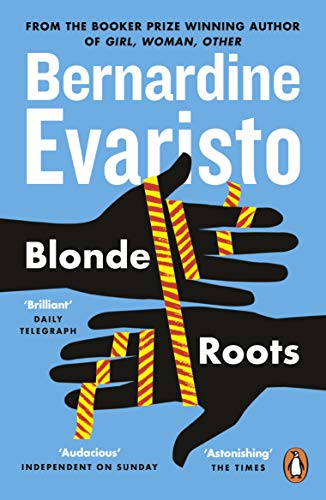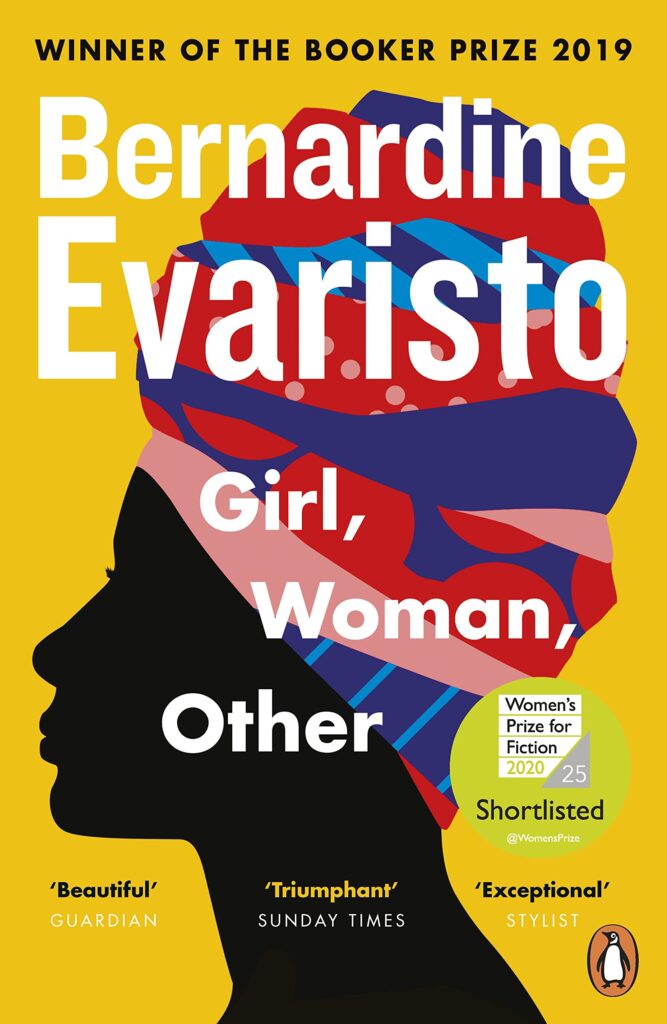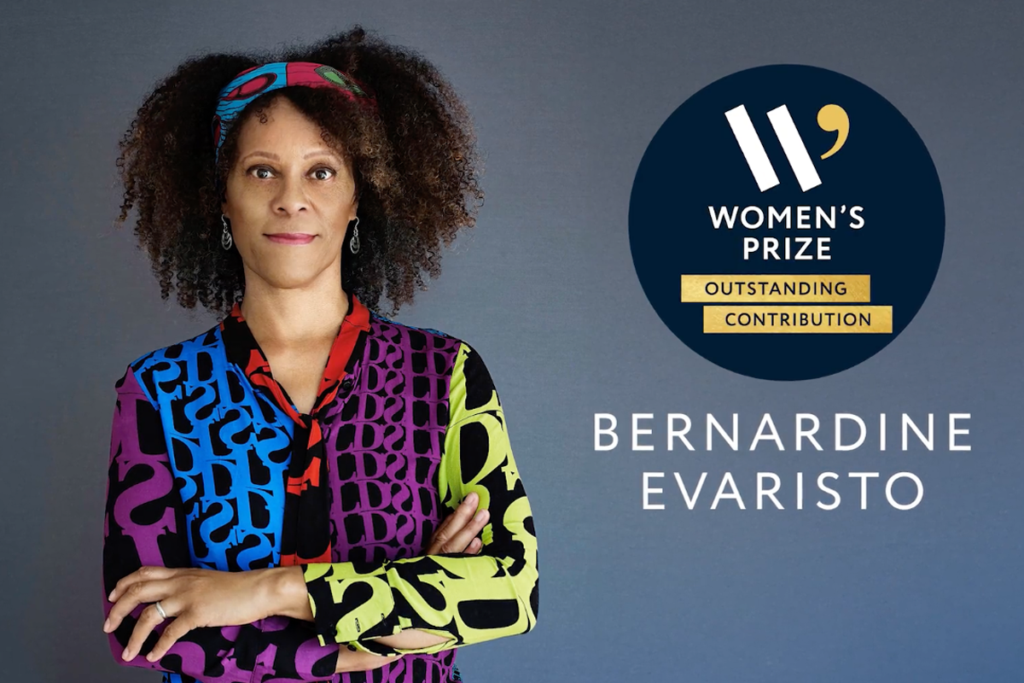In this exclusive interview, the recipient of the Women’s Prize Outstanding Contribution Award, Bernardine Evaristo shares insights into her work, her writing process and what the Women’s Prize means to her.
Can you see a golden thread in your body of work?
I’ve stayed very true to my original purpose, which was to explore the African diaspora through imagined stories of the past, present and future. And also to the spirit of invention that has been in my writing since I first began as a very young woman at drama school, when I was writing for theatre and I was writing verse drama – very experimental work.
When I ran Theatre of Black Women with Paulette Randall and Patricia Hilaire, the work was always very poetic, exploring aspects of the African diaspora, especially women’s lives. And then when I started to publish books, I continued to explore different areas of the African diaspora.
Some people have said to me in the past; isn’t that limiting? Isn’t it limiting writing about the African diaspora? We mustn’t forget that the African continent has over 50 countries and over a billion people. I see it as a really rich resource to explore in the way that people explore their own demographics, often, which are not African. With writers of colour, sometimes it’s seen as somehow limiting. Of course there’s a lot of history behind that kind of perception. So the golden thread through my work really is about experimentation, telling the stories that I haven’t been told in a way that I want to tell them.
Beyond your own writing, this award honours your role in enriching the world of books. What has motivated your support of fellow writers and literary institutions, and why is this kind of engagement important to you?
I’ve always found it incredibly satisfying to provide opportunities for other writers because it felt like the right thing to do and just rewarding in itself without wanting to sound very saintly or sanctimonious. Rewarding in itself that wherever I was with my career – whether it was a paid job or whether an idea that I had – that I could nurture other writers through providing opportunities for them.
I don’t want to be prescriptive about anybody else, but it’s very important for me to nurture the next generation. When I published my first book, which nobody really knows about, it published in 1994 and it’s a collection of poetry. There wasn’t really anybody out there to support me: the publishing industry did not open its doors to me; the poetry industry did not open its doors to me. I had to really struggle and hustle to try and get the book out there and to get one or two reviews, and so on. So I know what it’s like to have to work really hard, because I’ve done it for most of my career.
I know what it’s like to have to work really hard to get attention. That next generation is very important – we are all part of an ecosystem and we should be paying attention to each other.

What does your writing process look like?
My writing process is probably not what people expect. I began as an actor and working in theatre, and acting is about collaboration and community and physicality and performance and all of those wonderful, wonderful things. I never envisioned that I would be the kind of person who would spend as many hours as I have sitting down writing.
I think there’s always a tension between the job of sitting down and actually doing the writing and all the other things that I do in my life, because I juggle lots of things. I go on tour a lot, I sometimes judge prizes, I’m also a teacher at Brunel University of London. All of this happens in my daily life. But when I’m working on something, the focus is the writing and the writing gets done. I’ve come to understand that I need that tension between doing other things and writing.
If I’m not working on a major work – and that is very rare – then I can spend time away from my desk not writing, and it can be a bit harder to get back into it if I’ve spent too long away. The imagination is a muscle and you have to keep it going like a dancer or musician. But unlike a dancer and musician, we can spend time away and get back into it quite quickly.
I’m constantly redrafting almost every sentence before I reach the end of a chapter in a novel, and then I will redraft that chapter, and then eventually, I will work my way through to the end of the book, and then I will redraft it again, and then I will redraft it again. And at some point I’ll send it to my editor and I’ll get feedback, and I’ll redraft it again.
I will throw a manuscript away and completely rewrite it after several years. I don’t think many people do that, but that’s what I do. Or I will take a manuscript that I’ve spent years on and which is, for example, prose and turn it into poetry or a mixture of poetry and fiction and so on, and somehow I find my way through, and the book is eventually ready to be published, unless I’ve spent time on something that I really can’t make work, and I will literally throw it in the bin.
Have there been moments where feedback from readers has surprised or deeply moved you?
I get a lot of feedback from readers. I would say the book that keeps on giving is Girl, Woman, Other. For a couple of years, I did a lot of touring internationally, which I enjoy hugely. I’ve always loved travelling and meeting readers all over the world, on every continent.
I think the thing that surprised me the most was when people said: this book changed my life, and if I have the chance to ask them why, I will, and I still don’t fully understand what they mean by that. I think it’s because there’s 12 characters – 11 women, 1 non-binary – and their lives are written in such a complex way and distinct from each other, that people have points of entry into these characters, and they can see themselves, and that it’s validating for them.
That’s what I think they mean when they say that. I was really surprised and shocked when I heard it, especially when I’m talking to people from every racial background; when I’m travelling I might be in Brazil, or anywhere in Europe or Asia or Africa, even the Middle East.
We know that literature, especially fiction, storytelling, and creating characters that are dealing with the contradictions and complexities of what it means to be human, can generate empathy. I know that research has been done into this because it helps you understand other people’s lives and other people’s perspectives. That’s a really important thing that we need in this world: we need to understand each other, appreciate each other, acknowledge our differences, but also see the value in different people from different communities and demographics.
Literature is perhaps the deepest way in which we can experience other people’s lives and broaden our understanding of who we all are as people. Other art forms are incredibly powerful and impactful and effective. But with literature, I feel that we can go deep into the psyche of what it means to be human, in a way that isn’t necessarily so easily accessible in other art forms.

You’ve been a friend of the Women’s Prize for a long time, why do you think the charity’s work is important?
The Women’s Prize has revolutionised women’s fiction and now non-fiction. It is such an important prize. Not just for the winners, because the Women’s Prize always made a great deal of its shortlists and its longlists and all its satellite projects that are supporting aspiring writers.
I think we’re living in a very difficult time at the moment, where it feels as if misogyny is on the rise and the patriarchy is trying to close the doors on women’s freedoms and feminism and liberation and all those things that we fought for as women for well over 100 years, if not more.
And so the Women’s Prize is always a point in the literary calendar, the cultural calendar, where we can focus on women’s writing and support it and celebrate it and nurture it. Some people will say, oh, yeah, there’s loads of women getting published now, it’s hard for men to get published. Well, what are the statistics?
I want to know what the statistics are. I’m not interested in perception, because we’re always having to deal with perception that we’re seen to be taking over. This idea that if women are becoming more powerful, that men are becoming disempowered as opposed to just sharing a little bit of space?
I still see that we’re living in a world that’s run by men, right? I’d like someone to disprove that theory, but I can’t see any evidence of that. Although women have made huge gains. So we cannot divorce the Women’s Prize from what’s happening in society and the fact that when we have and believe in a progressive society, which includes feminism.
But the fact is that those rights can be taken away from us and we’ve witnessed that globally.
So this prize is a chance for us to keep up the momentum that women’s stories are really important. We value and cherish them and that we need to keep shining a light on women’s stories.
So it is a kind of activist prize as well. And what I love about the Women’s Prize is that from its very beginning, 30 years ago, it has always been inclusive. And that has been something that I have witnessed over 30 years. And you can’t say the same for a lot of other prizes. But there’s always been this consciousness in terms of the judges, in terms of the winners and the lists, that this is about a wide range of women, not just a particular, section of society.








